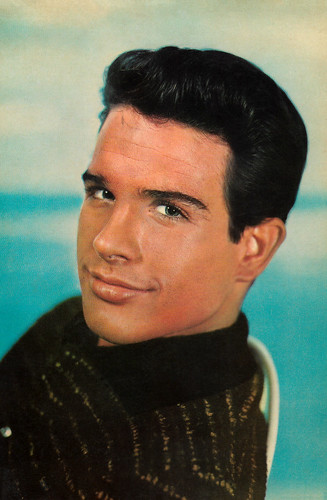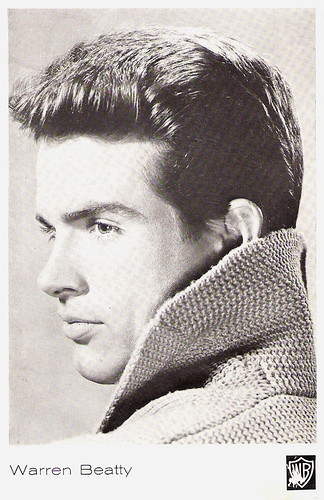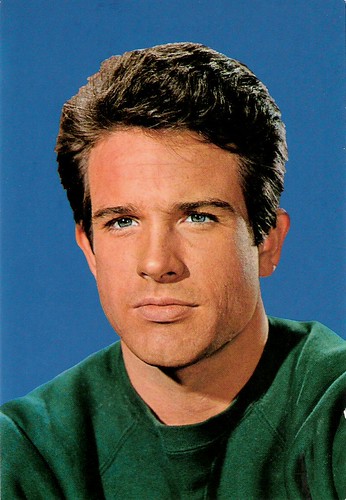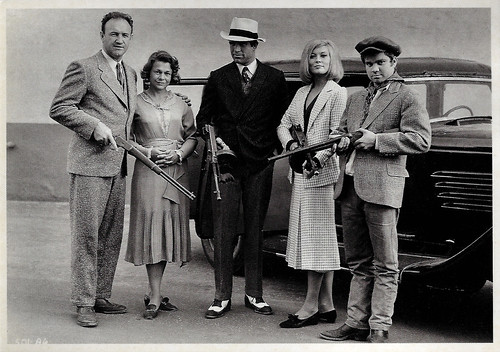
Spanish postcard by Raker, no. 1105.

Dutch postcard. Photo: Warren Beatty and Faye Dunaway in Bonnie and Clyde (Arthur Penn, 1967).

British postcard by Star-Graphics, London, no. S 94. Warren Beatty in Heaven Can Wait (Warren Beatty, Buck Henry, 1978).

British postcard New-Line, no. 229. Photo: Madonna and Warren Beatty in Dick Tracy (Warren Beatty, 1990).
A tortured teenager in love
Warren Beatty was born Henry Warren Beaty in 1937, in Richmond, Virginia, U.S. His mother, Kathlyn Corinne (née MacLean), was a teacher from Nova Scotia. His father, Ira Owens Beaty, studied for a PhD in educational psychology and was a teacher and school administrator, in addition to working in real estate. His older sister is actress Shirley MacLaine.
Beatty played football in high school but was more interested in theatre, encouraged to act by the success of his sister, who established herself as a Hollywood star. He attended Northwestern University in Evanston, Illinois, for one year before moving to New York City, where he studied with acting coach Stella Adler.
He occasionally appeared onstage and from 1957 on television as well. In 1959 he earned a recurring role in the television series The Many Loves of Dobie Gillis but left the show before the first season ended to make his only Broadway appearance, in William Inge's 'A Loss of Roses' (1959). Beatty received a Tony Award nomination for his Broadway debut.
He then made a strong screen debut as a tortured teenager in love in Splendor in the Grass (Elia Kazan, 1961) opposite Natalie Wood. The film was a major critical and box office success and Beatty was nominated for a Golden Globe Award for Best Actor and received the award for New Star of the Year – Actor. The film was also nominated for two Oscars, winning one.
His next films were Tennessee Williams' The Roman Spring of Mrs. Stone (Jose Quintero, 1961), with Vivien Leigh and Lotte Lenya, All Fall Down (John Frankenheimer, 1962), with Angela Lansbury, Lilith (Robert Rossen, 1963), with Jean Seberg and Promise Her Anything (Arthur Hiller, 1964), with Leslie Caron. Although interesting efforts, these films were mostly financial disappointments.

Dutch postcard, no. 662. Collection: Geoffrey Donaldson Institute.

Belgian promotion card by Vita to promote Splendor in the Grass (Elia Kazan, 1961). Photo: Warner Bros.

West German postcard by Kolibri / Friedrich W. Sander Verlag, Minden/Westf., no. 2769. Photo: Warner Bros. Warren Beatty in Splendor in the Grass (Elia Kazan, 1961).

Spanish postcard by Ediciones Raker, Barcelona, no. 323, 1963. Photo: Mundial Film. Warren Beatty in Splendor in the Grass (Elia Kazan, 1961).

Italian postcard by Rotalfoto, Milano, no. 1151.
A colossal hit and a milestone in cinema history
Taking command of his career, Warren Beatty formed a production company, Tatira, in 1965. Beatty assigned himself the duties of star and producer for Bonnie and Clyde (Arthur Penn, 1967), the story of Great Depression-era bank robbers Bonnie Parker (Faye Dunaway) and Clyde Barrow.
When he made his deal with Warner Bros. for Bonnie and Clyde, the studio had such little faith in the future box-office results from the $2.5-million production that it agreed to give the film's star and first-time producer 40% of the box-office gross. The deal worked out quite well for Beatty. Counterculture audiences of the 1960s identified with the film’s outlaw heroes, thanks largely to Beatty’s performance, which was filled with much compassion for Barrow and the poor in America.
Beatty had worked before with Penn on Mickey One (Arthur Penn, 1965). Bonnie and Clyde received much attention for the artfully rendered climactic shoot-out, which set new standards for screen violence. It became a colossal hit and a milestone in cinema history. It was nominated for 10 Academy Awards, including Best Picture and Best Actor (Beatty). Between 1967 and 1973 when the film played in theatres, it generated over $70 million worldwide at the box office, netting Beatty an estimated $28 million.
Never one to rush into projects, Beatty acted in only four films in the next seven years. From 1967 to 1974, he lived off-and-on with British actress Julie Christie. He co-starred with her in Robert Altman’s revisionist Western McCabe & Mrs. Miller (1971). He also played the lead in Alan J. Pakula’s paranoid thriller The Parallax View (1974).
His next big hit was Shampoo (Hal Ashby, 1975) with Julie Christie, Goldie Hawn and Lee Grant. Britannica describes the film as "a comic sex romp, flavoured with a left-wing sensibility". Beatty plays a womanising hairdresser who finds it impossible to juggle all his lovers on the eve of Pres. Richard Nixon’s election in 1968. Beatty starred in the film, produced, and wrote it with Robert Towne. Shampoo was nominated for four Academy Awards. Even more successful was Heaven Can Wait (Warren Beatty, Buck Henry, 1978) again with Julie Christie. It was a showcase vehicle for Beatty’s comedic talents. Beatty was nominated for Academy Awards in four separate categories (Best Actor, Best Picture [as producer], Adapted Screenplay, and Best Direction), an unprecedented achievement in Hollywood history and an achievement he was to repeat with his next film.

Spanish postcard by Archivo Bermejo, no. C-70. Photo: Warner Bros. Warren Beatty in Splendor in the Grass (Elia Kazan, 1961).

French postcard by Editions P.I., Paris, no. 1157, no. 1105. Photo: Warner Bros. Warren Beatty in The Roman Spring of Mrs. Stone (Jose Quintero, 1961).

Canadian postcard by Canadian Postcard, no. A-216. Warren Beatty in All Fall Down (John Frankenheimer, 1962).

American postcard by Quantity Postcards, San Francisco, CA., nr. SC. 11.

French postcard by E.D.U.G., no. 260.
A star-studded adaptation of a comic strip
Reds (Warren Beatty, 1981) was the film that established Warren Beatty as a serious filmmaker. The historical epic about American Communist journalist John Reed who observed the Russian October Revolution of 1917 received Oscar nominations in all the major categories and won Beatty an Oscar for Best Director. He did not direct again for nine years when he chose as his next vehicle a star-studded adaptation of a comic strip.
Dick Tracy (Warren Beatty, 1990), co-starring Al Pacino and Madonna, received positive reviews and was one of the highest-grossing films of the year. His notable films of the 1990s include Bugsy (Barry Levinson, 1991), about the infamous gangster, and Love Affair (Glenn Gordon Caron, 1994), both costarring Annette Bening, whom Beatty married in 1992.
In 1998 he co-wrote, directed, and starred in Bulworth, playing a U.S. senator whose disillusionment with the political system is fueled by his immersion in hip-hop culture. Despite the accolades he received, Beatty was also part of two of Hollywood’s most expensive failures, Ishtar (Elaine May, 1987) and Town & Country (Peter Chelsom, 2001).
After a 15-year absence, he returned to the big screen with Rules Don’t Apply (Warren Beatty, 2016), about the relationship between an aspiring actress and her driver, both of whom work for Howard Hughes. In addition to starring as the eccentric millionaire, Beatty also wrote and directed the romance.
The Academy of Motion Picture Arts and Sciences granted Beatty the Irving G. Thalberg Memorial Award for his body of work in 2000, and he was a 2004 Kennedy Center Honor recipient. In 2008 Beatty received a lifetime achievement award from the American Film Institute. Warren Beatty and Annette Bening have four children: Kathlyn (b. 1992), Benjamin (1994), Isabel (1997) and Ella (2000). Daughter Kathlyn transitioned to male at the age of 14 and changed her name to Stephen Ira Beatty.

Dutch postcard. Photo: Faye Dunaway and Warren Beatty in Bonnie and Clyde (Arthur Penn, 1967).

Canadian postcard by Canadian Postcard, no. A-18. Photo: Columbia TriStar. Gene Hackman, Estelle Parsons, Warren Beatty, Faye Dunaway and Michael J. Pollard in Bonnie and Clyde (Arthur Penn, 1967).

French postcard by Editions Hazan, 1996. Photo: Raymond Depardon. Faye Dunaway and Warren Beatty at the premiere of Bonnie and Clyde (Arthur Penn, 1967).

Dutch collectors card by Edito Service S.A. in the 'Filmsterren: een Portret' series, 1993, no. D5 024 62 09. Photo: A. Pelé / Stills. Warren Beatty in Bonnie and Clyde (Arthur Penn, 1967).

Dutch collectors card by Edito Service S.A. in the 'Filmsterren: een Portret' series, 1993, no. D5 024 62 09. Photo: The Kobal Collection. Warren Beatty in McCabe and Mrs. Miller (Robert Altman, 1971).
Sources: Britannica, Wikipedia (Dutch and English) and IMDb.
No comments:
Post a Comment